Frosthaven is one of the most anticipated games of 2023, sequel to the absurdly successful Gloomhaven and its little sibling Gloomhaven: Jaws of the Lion. With over 100 scenarios in the Frosthaven campaign, branching pathways and hundreds of secrets to discover, reviewing this iceberg of a game requires more than just a single person.
Happily, Meeple Mountain is up to the task and today David McMillan, Jesse Fletcher, Will Hare and Andrew Holmes discuss their separate and combined experiences venturing to the frozen outpost of Frosthaven. Before we get onto discussing the game itself though, we’ll just introduce our previous experiences with the series and how we’re each playing through Frosthaven.
David: My first experience with a Gloomhaven was a brief, single excursion on my back porch one warm spring evening a few years back with Jesse, our friend Andrew Plassard (who’d brought along the first edition of the game), and my wife. If I recall correctly, the campaign for the game’s second printing was ongoing on Kickstarter at the time.
While that experience didn’t convince me to pull the trigger on it, it certainly put the thought into my head that, someday, I wanted to own my own copy of the game. It was just THAT good. Jesse, on the other hand, did buy a copy and, when it finally arrived, he invited my wife and I to join him for a campaign. It was an invitation we gladly accepted. We met about once a month (more if we could) and that lasted up until a combination of my wife and I having a child and COVID put the kibosh on it.
By the time the worst of the crisis had passed, things had changed. Not only did my wife and I finally have some kind of childcare worked out, thereby rekindling the dying embers of our social lives, but Frosthaven was on the horizon.
We all agreed that it didn’t make any sense to pick up our Gloomhaven campaign with Frosthaven imminent, so we hunkered down and waited until the glorious day that Frosthaven arrived on our doorstep. And, we’ve been meeting up and adventuring together twice a month (or thereabouts) ever since.
My personal experience with Frosthaven extends as far as what we’ve encountered as a group. Jesse, though… well, that’s a different story. He’s got much more Frosthaven under his belt than I do.
Jesse: Like David, my first play of Gloomhaven, though I vaguely recall us losing pretty handily, was a blast. I was determined to play as much Gloomhaven as I could. In addition to the campaign I played with David and his wife, I started another group campaign with two other friends, and a solo campaign. Using some campaign tracker apps, copious notes, and a lot of sorting and resorting, I was able to carry on all three campaigns simultaneously, and loved every minute. The Frosthaven Kickstarter was naturally an instant-back for me. With this one, I’m down to just two campaigns–the aforementioned adventures with David and company, and one solo campaign. In my solo Frosthaven campaign, I’ve done about 15 sessions worth, going through around 30 scenarios.
Andrew: I suspect that I’m like a lot of people in that I was curious about Gloomhaven so tried out Jaws of the Lion, loved it and then felt that I’d rather wait for Frosthaven than ‘go back’ to Gloomhaven itself. In comparison with the others I’m therefore more of a newbie to the “Haven” series. My wife and I are playing through Frosthaven just the two of us with one character each.
Will: My first time with Gloomhaven was just me going all in on the box and planning it as a fun date night game for me and my husband. We had occasional “guest stars”, as we called them, who would join us for random scenarios here and there, but it was mostly just the two of us. It took us roughly four years of off-and-on weekly play sessions to slowly work our way through the campaign. We foolishly picked up Forgotten Circles and Jaws of the Lion thinking we’d have time to work our way through those before Frosthaven landed on our doorstep, but we just barely finished up our campaign by the time it arrived. Those other titles now sit on the shelf of shame, menacing us.
So there we go. Four different games being played, four different approaches and experiences, and the Atlantic Ocean between us (hence the mix of American and British English peppering this review). Let’s crack on with the discussion!
First Impressions
Andrew: I knew Frosthaven was going to be big but I wasn’t prepared for the sheer scale of the thing. My three and a half year old daughter can curl up in the box lid and use it as a pretend boat. It takes a full minute for the box lid to slide closed if left to gravity.
David: No kidding. And you didn’t even mention how freakishly heavy it is! If you haven’t got time to make it to the gym but want to be buff, you can always deadlift Frosthaven instead!
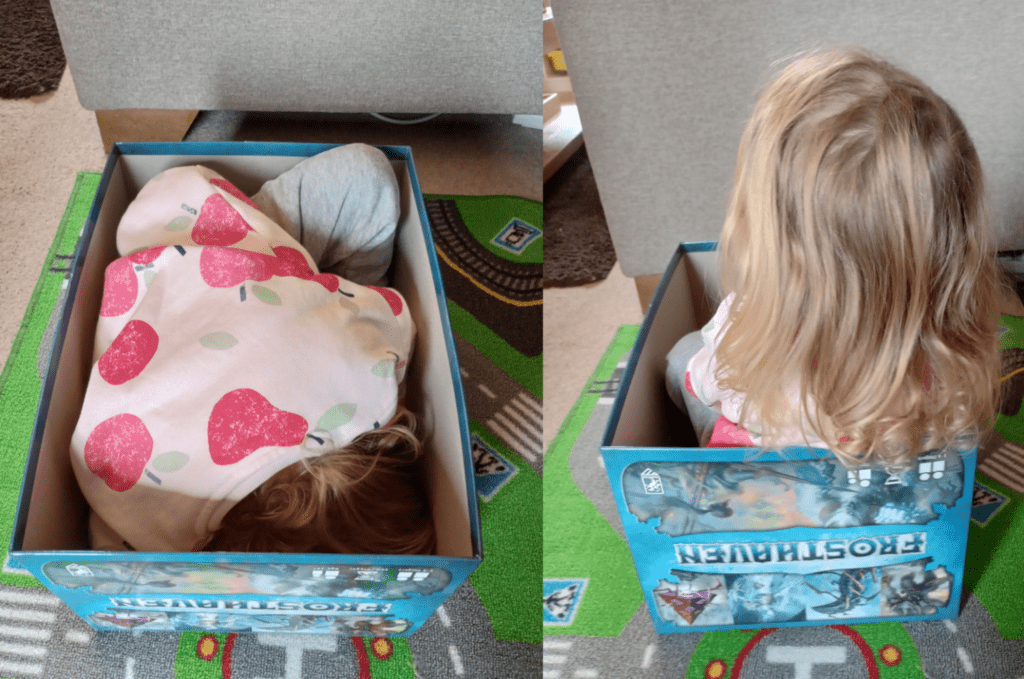
Andrew: Sorting Frosthaven was a full evening, although satisfying with some drinks and good music. Putting it all back in the box isn’t as satisfying. The included card organiser is serviceable but then you lay the map tiles out and slosh in the monster bags full of blood red cards on top. The end result resembles open heart surgery. I’m cheap so instead of a proper insert (like the Folded Space insert that David reviewed) I rescued a couple of fruit punnets for the monster bags (labeled and alphabetised) and an old accordian folder for the map tiles. Works a treat and easily saves 10-15 minutes a game.
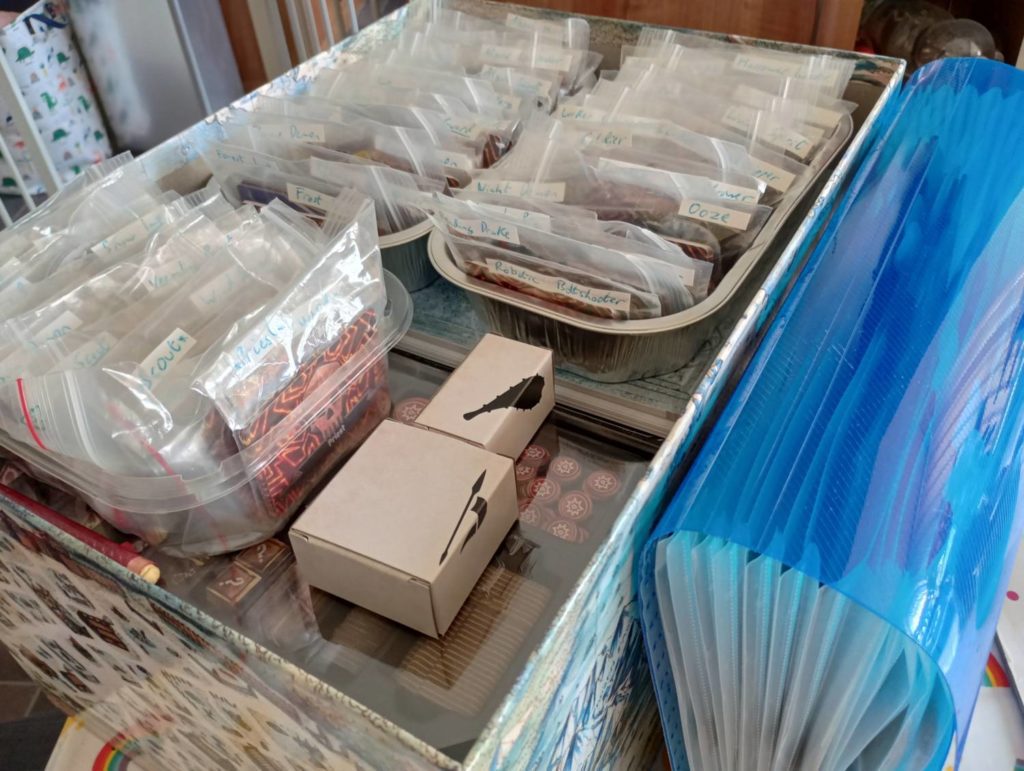
David: That first night, I did little more than punching everything (which took FOREVER), sorting all the monster tiles and shoving them into baggies, and then throwing everything back into the box according to the little sheet that came with it. Before I’d even tossed in the last baggie, I thought, “This is a mess.” I knew I needed an organizer. That’s one lesson I took away from Gloomhaven. I also knew that there were a lot of components, such as the monster card decks and health trackers (there’s an app for that!), I’d never touch again apart from placing them back into that box for the first time.
For those first few sessions, I was still sans organizer and the setup was a real pain. Now, with organizer in hand, it’s far less so. I bemoaned how the monsters are handled in my review of my organizer and I don’t ever see that getting any better. But, it’s definitely much better now than it was back then.
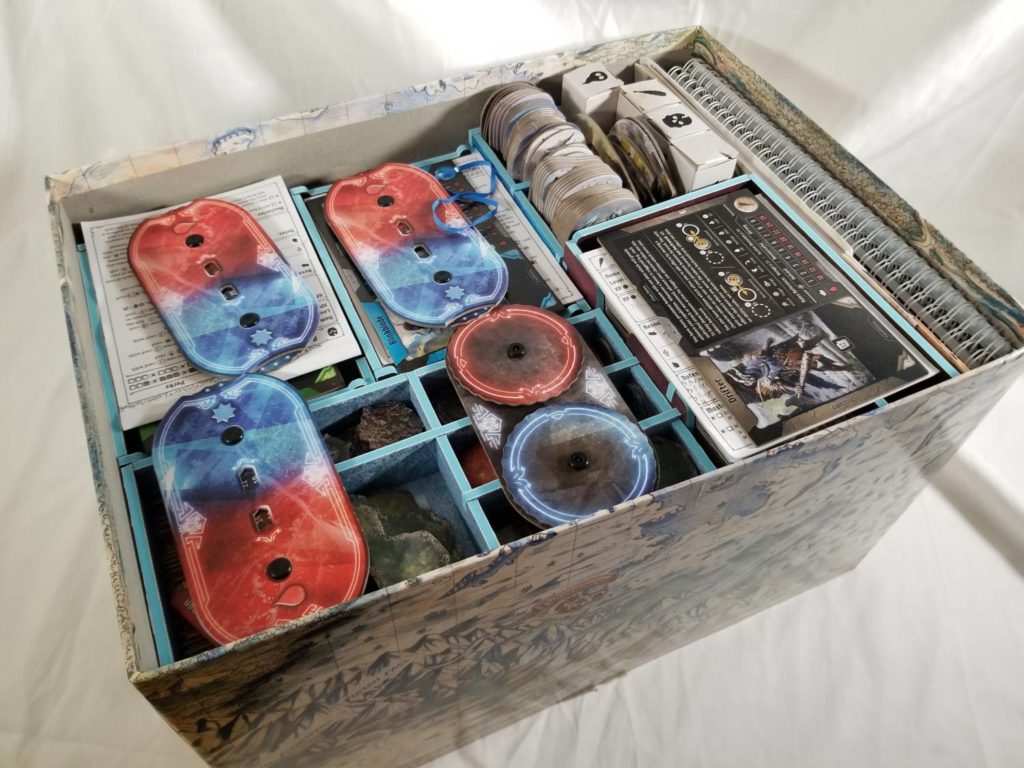
Will: I was so overwhelmed when Frosthaven finally arrived. We also picked up the Folded Space organizer. For Gloomhaven, I scraped together a ramshackle storage solution from the popular Y.A.S.S. storage guide on BoardGameGeek. It worked, but it was finicky. I knew we needed something more substantial for Frosthaven. My husband and I sat down on a Saturday afternoon to start assembling it, and fourteen man hours later, everything was finally glued and put in place. Then we eyeballed the stack of unpunched cardboard and said, you know what? Maybe we leave that for future-us to deal with.
Getting Stuck In
Andrew: We aren’t going to explain the rules here, but much of Frosthaven, especially in the scenario phase, is very similar to Gloomhaven. If you want an idea of the quality ot the scenario gameplay in those games, check out Meeple Mountain’s reviews of Gloomhaven and Jaws of the Lion.
Jesse, in your First-take on Frosthaven after a couple of scenarios you said that “At this point, it just feels like more Gloomhaven”, which was what you wanted. Has this changed as you’ve progressed further through the scenarios?
Jesse: Let me answer that by going on a slight videogame tangent. Zelda: Breath of the Wild was a massive game that took the Nintendo world by storm. Getting lost in its world and spending hours in its gameplay was a straight-up joy. Its newly released sequel Zelda: Tears of the Kingdom is set in the same universe with mostly the same monsters, a lot of the same gameplay goals, and a familiar but vastly upsized landscape. The mechanics however are different, allow for more complexity and experimentation, and ultimately a greater game experience for me, despite losing a touch of its initial charm.
Frosthaven is to Gloomhaven what Tears of the Kingdom is to Breath of the Wild — a sequel set in the same universe, upsized in scale and complexity, with all the trappings of the original but added mechanics, with familiar yet often surprising new experiences.
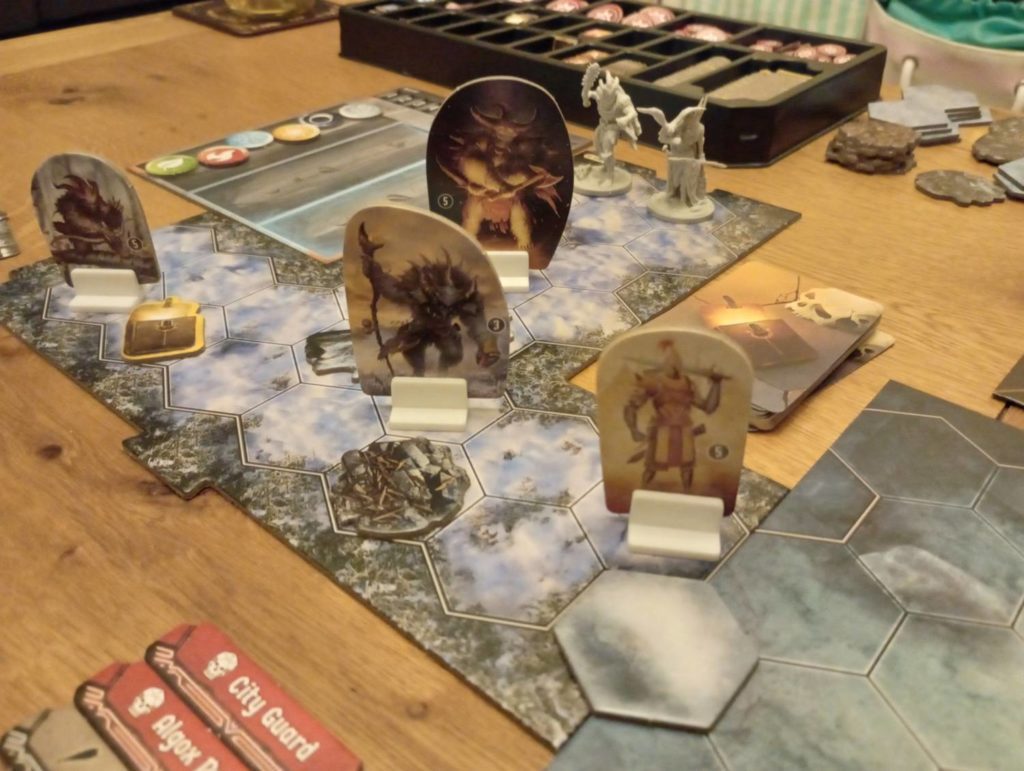
David: Jesse, you echoed my sentiments exactly. In a lot of ways, Frosthaven is a much better game, too. But, I feel like it’s definitely not the best entry point into the series. The starter classes are the equivalent of some of the more complex ones you’d eventually unlock in Gloomhaven. I know Jesse and I have watched the new person in our campaign struggle a bit to really grasp just what their class is capable of. He’s never experienced anything in this game universe before, so he doesn’t have that previous knowledge to draw on.
Where Gloomhaven held its hands underneath you while you learned to paddle and stay afloat, Frosthaven tosses you into the deep end and wishes you good luck.
Will: The Zelda comparison is an apt one. I found the design of Frosthaven certainly assumes a certain familiarity with the system, so the game has no trouble throwing you into the deep end more quickly. The starting classes of Gloomhaven were all iconic in their own right, but felt more built around semi-standard RPG archetypes to ease the transition for new players. The most complex character, arguably, was the Mindthief who had to juggle static buffs, and that mechanic was hardly unique to that class.
The starting classes of Frosthaven, by comparison, each seem to be more fully realized around a central mechanic and theme. Each of them play drastically different from one another. As someone who foolishly chose Geminate as his starting class while thinking he could easily manage the new mechanics, I come back licking my wounds to report that this game is a lot harder, y’all. We actually had one player pick the other complex starting class, and after a couple sessions they put the character aside and rolled up a new one because it was just way too much.
Andrew: Yeah, even starting with the ‘easiest’ characters we found it to be a fair step up from what we’d experienced before. We also missed the learning scenarios of Jaws of the Lion. Sure we knew all the basics but it had been over a year since our last play and Frosthaven’s rulebook for scenarios is good but could be better. And whilst I enjoyed the theme of the training scenario, it’s only training in that it’s easy, not that it helps you learn the rules.
I thought the combat mechanics and the scenario designs were great in Jaws of the Lion but, for me, Frosthaven expands on all of that and goes so much further. I can’t compare to Gloomhaven but I love the moment a turn or two into a scenario when the momentum builds and we’re completely transported into the game.
The Outpost Phase
Andrew: If the scenario phase carries a lot over from its predecessors, the Outpost phase is entirely new, a second type of game threading between the campaign scenarios.
Honestly, I like the Outpost phase more than it deserves. I love the idea. I love how Frosthaven grows and changes, how it becomes another character in the game, how it creates a richer and more complete world.
But… I don’t really love the actual mechanics, it’s largely admin dressed up. It doesn’t help that the rules for the Outpost phase are a bit rubbish – we spent our first few Outpost phases constantly flicking between pages in the manual and still getting things wrong. But I think it’s also because whilst the map board is beautiful and sticking new things to grow and develop Frosthaven itself is satisfying, the fact that the actual town stuff happens by going through a deck of cards feels disconnected and the rewards aren’t all that exciting. I’ve still not felt the joy of the Outpost phase that I really want to feel. That alchemy chart is a wonderful creation, though. Top marks there!
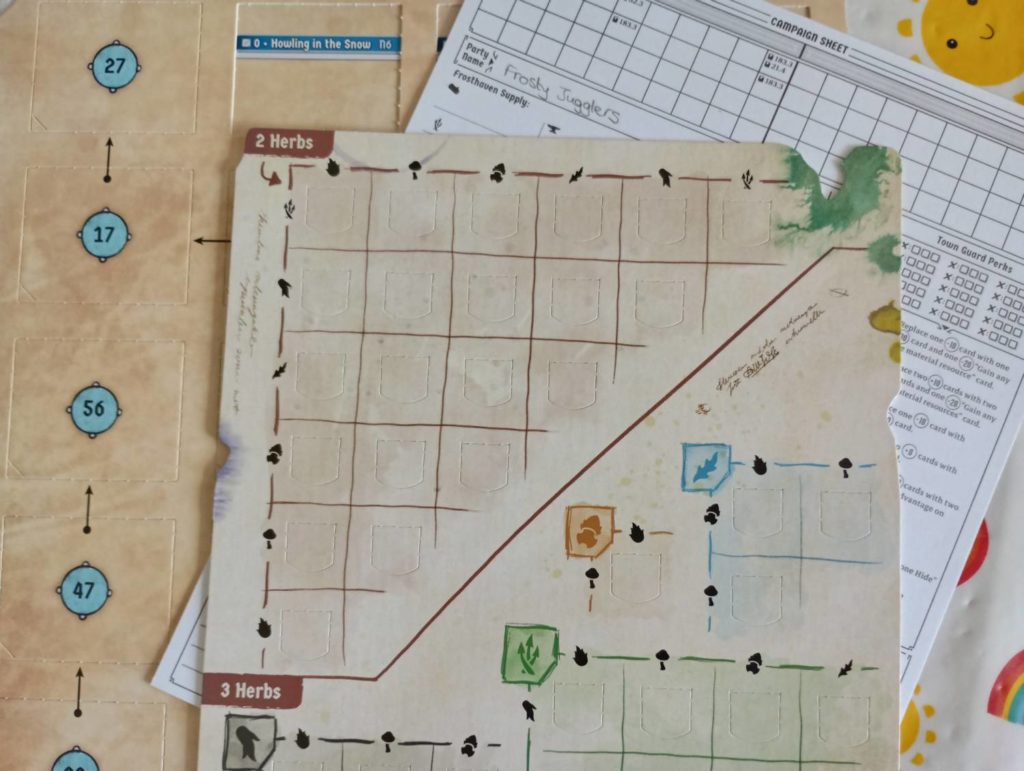
Jesse: I tend to agree with you on that one. The Outpost phase, though integral to the enhanced experience that Frosthaven offers, just feels a little clunky. The concepts of building a town up from next to nothing, crafting your own items, mixing herbs you’ve found to create potions are all fantastic, but the overall Outpost experience can sometimes be a bit of a slog. Not to mention that it’s typically designed to take place after a scenario is over, further stretching out what was likely a long game session anyway. There are plenty of times where we opted to table the outpost phase until the next game session simply because the scenario took so long. I’m wondering how many groups house-rule it to do the Outpost Phase before the scenario phase to conserve some mental stamina.
Will: My party hates the Outpost phase so much that they just want me to do it in-between sessions so they don’t have to touch it. I try to present the options to them of what we can build or craft, and it’s largely met with some eye rolls and shrugs. I think there are a few things that hamper this phase, but specifically for me, the actual building cards feel so removed from the game. We’ve probably played close to ten sessions by now and I still couldn’t tell you which side of the building cards are healthy, which ones are damaged or wrecked, and what each symbol means.
I’ve also been less than pleased with outpost combat. We’ve had it happen maybe twice in the ten or so sessions we’ve had, and we’ve lost both combats. The punishment for losing feels awful, but the investment required to build up your walls and raise your defense feels unsatisfying. Who wants to spend precious resources making their defensive numbers go up on the off-chance they draw a combat card?
David: For me, the Outpost phase is the boring set of encyclopedias between some really cool bookends. The only thing exciting about it is that it’s where I level up, combine herbs, and encounter outpost events where I might even get to participate in pie-eating contests. Maybe it’ll become more fun as the campaign moves forward. At least, I hope it will.
Frosthaven’s Production
Andrew: We’re not using an app so the only thing different about our experience from the game that arrived on our doorstep is our punnets/folder home-made organisation. It’s a wonderful production, but before the punnets/folder it wasn’t at all fun setting up/putting away and that really hurt the overall experience for us. After the punnets/folder the physical issues mostly went away. It’s a big game, there’s a lot of stuff but it’s just about manageable.
Jesse: Oof, I can’t even imagine not using an app like X-Haven Assistant (iOS, Android) to track the monster AI and health. It’s already enough of a table hog without having to set out individual decks and stat cards for every single monster. Not to mention the amount of mental math needed to check each monster’s initiative order and base stats when trying to figure out their actions.
“Okay, Flame Demons do an Attack + 1, Move -1. Elites’ standard movement is ‘x’, attack is ‘y,’ so they move ‘x – 1’ spaces and attack the Drifter with ‘y +1’. Oh wait, no, the Wind Demons go first and have ‘z’ movement…”
I can understand some gamers’ reluctance to incorporate a ‘digital’ element into their analog tabletop games, but I can honestly say that without helper apps, I wouldn’t have gotten this far into the “Haven” system.
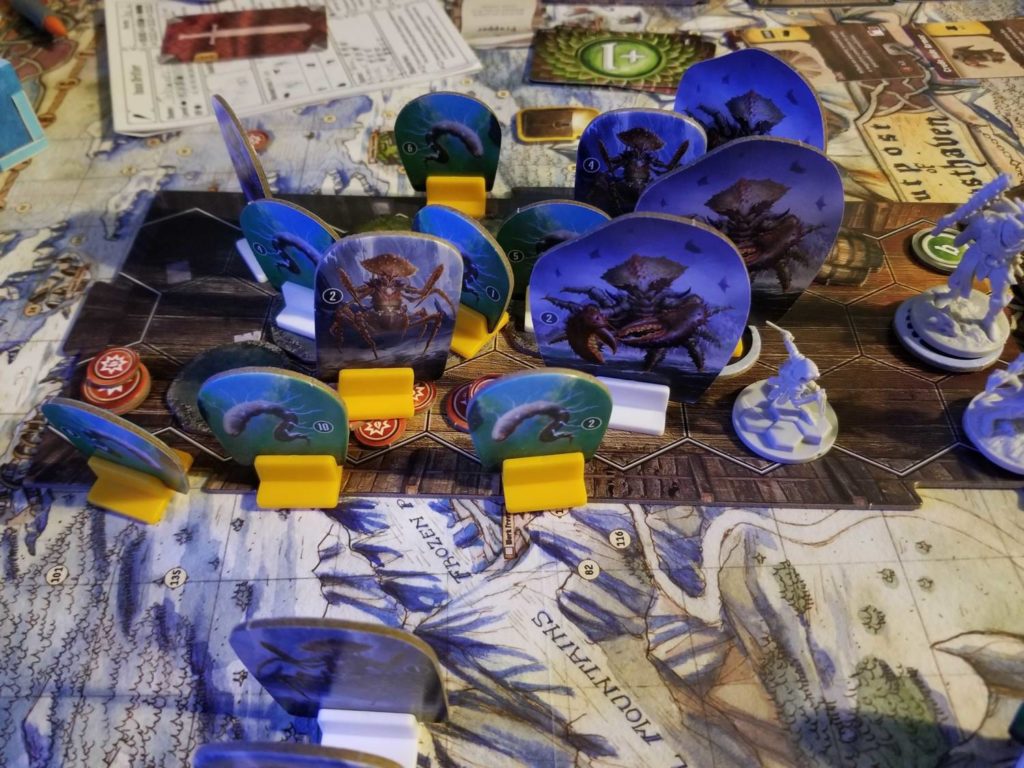
David: Yeah. After that first night on my back porch with Gloomhaven—the one and only time I have played any of the Havens without the assistance of an app—I knew that I never wanted to do that again. If it weren’t for the existence of the app, I doubt I’d ever want to play it again. The sheer amount of frustrating admin is ludicrous.
Speaking of apps, I’m glad we’ve got the Forteller narration app. Those people do some amazing work. While I loved playing the Havens without it, I REALLY love playing them with it. If you’re longing for more immersion, you need Forteller in your life.
Andrew also touched on the process of stickering the board. I don’t know why, but stickering the board in Frosthaven feels much more fulfilling than it ever did in Gloomhaven. Maybe it’s because I’m building up two things simultaneously? I’ll have to think about that. Regardless, it’s a nice map.
Andrew: I love the map, it’s gorgeous. I wish it was a standard picture frame size so we could have it on the wall. It’s massive though and so unwieldy. I actually wonder whether splitting it in two might have been better – separate maps for Frosthaven itself and the wilds around Frosthaven. Would have been a damn sight easier to manage; having to completely clear the table just to sticker the map is a chore.
Will: The various symbols for upgrades and constructions for the buildings in Frosthaven are pretty tiny as well. A separate board just for Frosthaven itself might have allowed for bigger and more legible symbols. For the first couple of sessions, we didn’t even realize you were supposed to glean important building information from the printed board itself. Then we spent an embarrassing amount of time squinting at the symbols on the board to figure out what they represented. For those of you who are reading this later: that one symbol you can’t figure out and have Googled for twenty minutes represents your prosperity level.
David: You guys reminded me of another small gripe I have about the map: it’s weird that the alphabet runs backwards across the top of it. I wonder what the reasoning was in putting the letter ‘A’ on the far right and then moving left from there. Your brain keeps wanting to look for ‘A’ on the top left. It feels counterintuitive and it makes it hard to figure out where stickers go.
Any other frustrations you guys can think of?
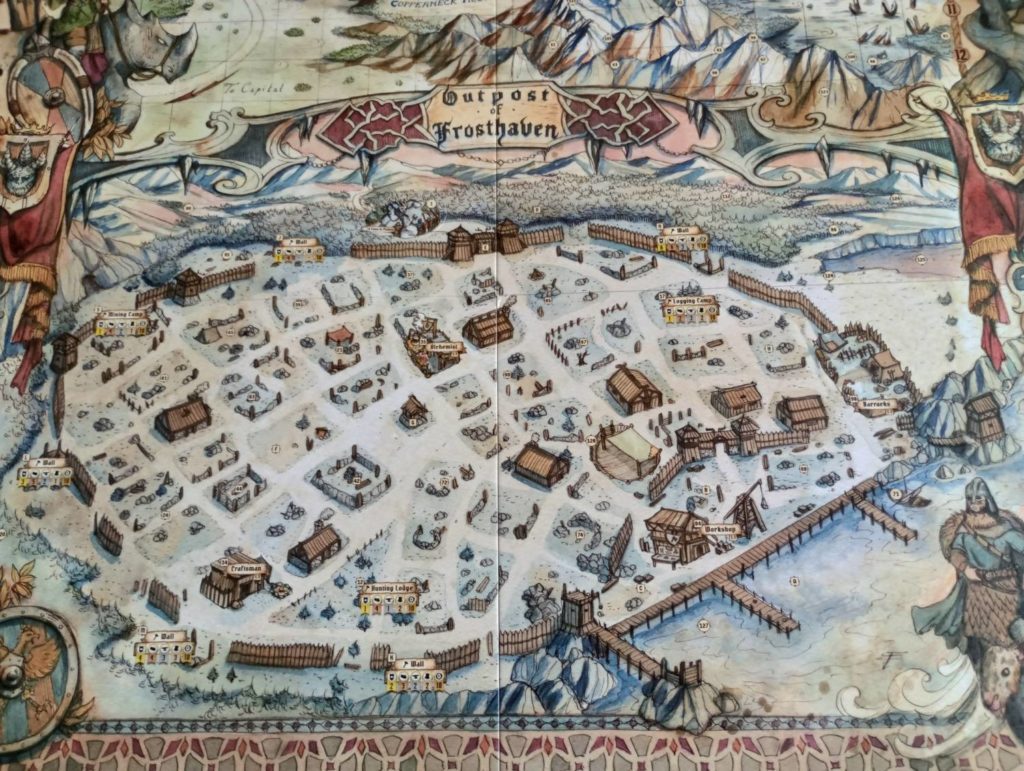
Andrew: The overlay tiles can be particularly frustrating. Those snow-coloured tiles are obstacles, this slightly-different-coloured snow tile is a snow corridor, and that one is a snow door. Oh, and how do we interact with them differently again? Not game-breaking but a couple of the different types could be a little more distinct from each other.
David: ^ THIS ^
Jesse: Yeah, I definitely would’ve appreciated a little more color variation in the tile art. I’m pretty sure that I’ve used the “wrong” tile before to represent a corridor or door.
Andrew: I know I have.
Will: I wonder does it even matter? Do the variations on color and such improve the gameplay and immersion or are they pointless? I haven’t run into a scenario yet where I was glad I had slightly off-white-off-blue tiles AND slightly-blue-off-white tiles. The scenario book changes what type of terrain each overlay tile is from scenario to scenario, so I’m not sure what purpose the multitude of terrain tiles serve.
Andrew: After a couple of scenarios I stopped wasting time trying to find the exact shade of snow and settled on ‘it’s good enough if it’s distinct from the other types of tiles in play’. This might say more about my eyesight and the light in our playing space though!
Jesse: Whereas Gloomhaven’s overlays were all varying shades of easily mixed up brown, Frosthaven repeats this problem, just with a different color hue. Not to mention that one specific tile may be an obstacle, a door, even difficult or hazardous terrain depending on the scenario. I wonder if some color-colored bases could have been included to delineate between the tile functions, since the scenario map and rulebook color-code them accordingly.
David: It feels like we kind of drifted off into negative territory there. To swing it back around, a recent conversation with Will in our Slack channel reminded me about the scenario flowchart, and that’s worth talking about. I really like how it’s structured. There’s never any question of what you’ve done, where you’re going, or what you’ve unlocked. I really like it. However, I can’t compare it to Gloomhaven as I was never in charge of keeping up with that stuff. In my campaign, Jesse pretty much took the lead on all of that. Maybe he or Will can provide better insight into how the old way of doing things compares to the system that Frosthaven has in place.
Jesse: Oh man, yeah, I forgot how good that flowchart is. I had a custom one for Gloomhaven that I got from BoardGameGeek but it still didn’t really help me remember where we came from.
Absolute favourite thing about Frosthaven
Andrew: The sheer scale of the thing. It’s incredibly immersive, there’s so much to do and discover and yet there’s a focus to it that means nothing is aimless wandering. As you play through, your horizons just expand in all directions. I love that. The combat is great, the town is okay but that combination and the way the setting builds and develops with you is something that no other board game I’ve played has come close to, not with this sense of scale. It’s so impressive.
Jesse: For me, it’s going to be the same as the original: the gameplay. The combination of pre-selecting a hand of ability cards before you start the scenario, selecting two cards each round, then using those cards to best react to what the enemies do, is the perfect combination of long-term strategy and short-term tactics. The hand-management is challenging but not punishing; the scenarios are nearly always down-to-the-wire. I’m happy to see that Frosthaven hasn’t lost a step from the original.
Not to mention that every class plays uniquely. Not just every class in Frosthaven. Every class in Frosthaven, Gloomhaven, and Gloomhaven: Jaws of the Lion plays differently. That, in and of itself, is a monumental achievement of game design.
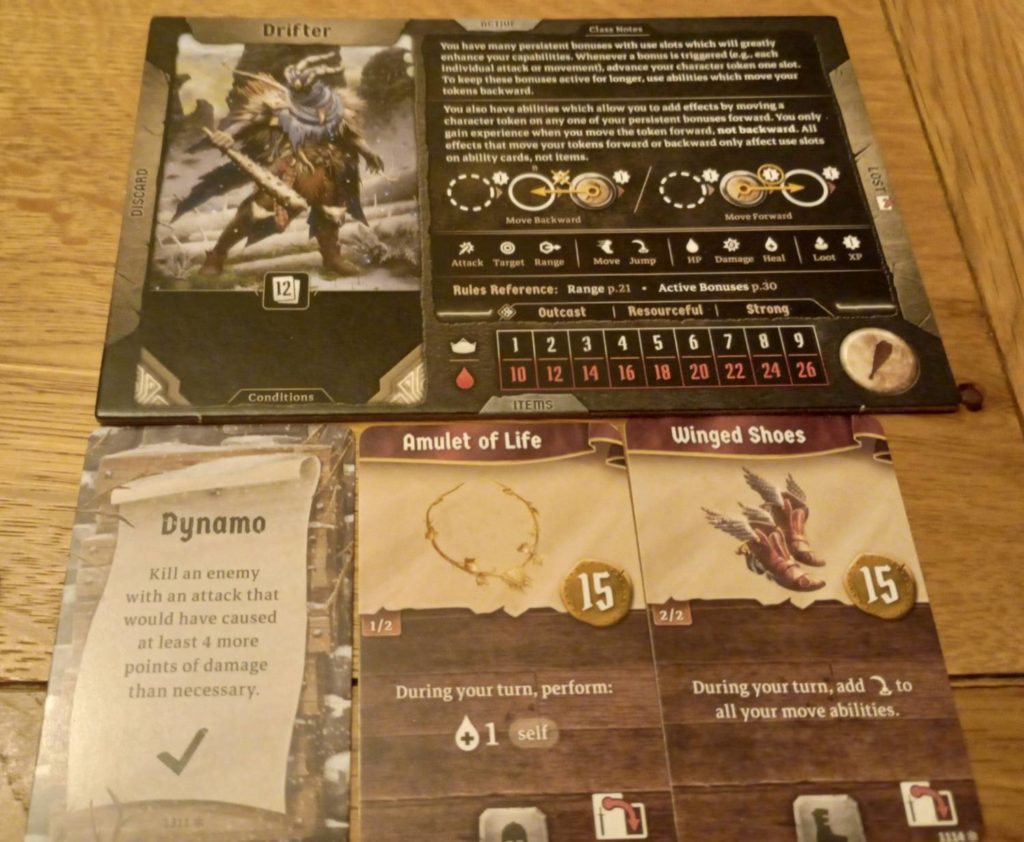
David: I love the process of getting to know your class and watching it evolve over time. I deliberately don’t look at the cards I haven’t gained access to. It just adds an extra level of excitement. Leveling up and seeing what awesome thing I’m going to be able to do next is a feeling I can only liken to opening a booster pack of Magic: the Gathering cards and finding that one card that really brings your deck together. And that anticipation of getting to take that new thing out for a spin and show it off to my teammates is *chef’s kiss*.
Will: For me, it’s the sense of discovery. That’s what drew me to Gloomhaven in the first place. I loved how much mystery there was in the box, and even when you thought you could guess what the game could throw at you, it would subvert and twist your expectations. Frosthaven has that, but even more of it.
I’ve played many legacy games in the last decade, and sometimes the excitement of unlocking a shiny new sticker or box can be undermined by the actual thing inside being dull or not adding much. Thus far, every unlock in Frosthaven has garnered an awe-stricken gasp or wide grin from at least one player in my party, and there’s still so much more to see in the box.
Least favourite thing about Frosthaven
Andrew: My main issue with Frosthaven is its accessibility. Life-stuff happened a month or so into owning the game and it’s been a struggle to keep going. There are so many barriers that get in the way of playing the game. It can take ages to set up and put away, even when you know what you’re doing. The rulebook could be better and there are a lot of little rules to remember. Scenarios can take hours (of fun) but there’s no fail-forwards so you’ll end up repeating the same scenario to progress the story. And the Outpost phase can take much of an evening in its own right which isn’t great when it’s easily the weakest element of the experience.
Part of all this grumbling is due to us. The planets need to align for us to play Frosthaven. We’ve taken a slightly flexible approach to ‘winning’ in order to not be put off by failing and needing to repeat scenarios. After Jaws of the Lion we thought we were ready for Frosthaven but it’s a bigger step up than we anticipated and maybe waiting for Gloomhaven Second Edition would have been better.
You both mentioned Frosthaven being more complex, the class designs harder. I agree. They’re clever and interesting, but they also require a lot more work from the players and at the end of a long day of work and sorting two young kids, my brain just can’t hack it sometimes. Ten years ago we’d have been all over this game, now it’s a lot harder to fit it into our lives. We’re enjoying it, we’ll keep going but it’s definitely got a high barrier of entry and that’s been a problem for us.
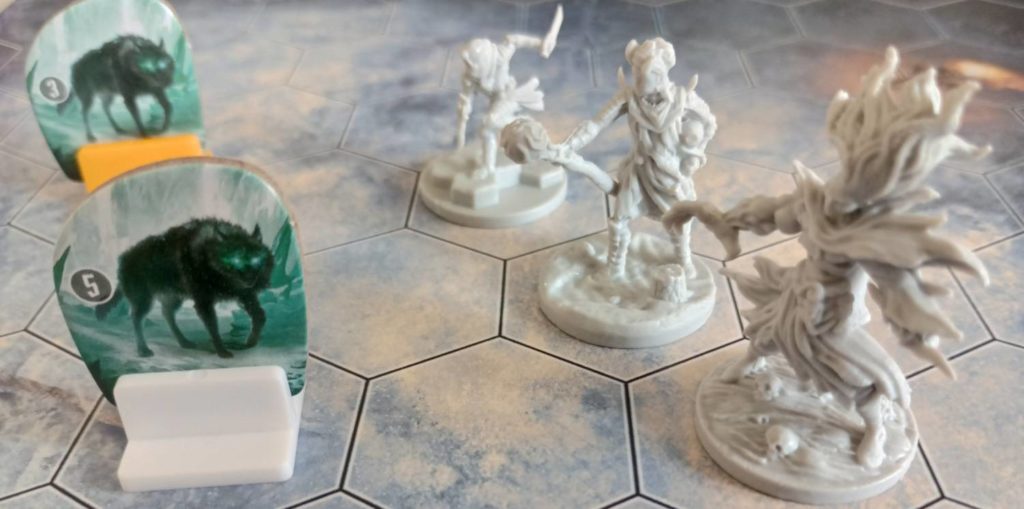
Jesse: I think it’s interesting how your least favorite thing is basically a byproduct of your favorite—Frosthaven’s epic scale. If it were smaller, it would be easier to get to the table, but would subsequently lose part of its appeal. I can definitely empathize with the scheduling difficulty. I’m doubly fortunate in that two of my adventuring companions live under the same roof, and I have a designated table at home that I can just leave the game unpacked for my solo campaign.
Andrew: That’s absolutely a fair point Jesse! To revisit your (excellent) Legend of Zelda analogy, all the time you spend with those Zelda games is time spent playing those games, the same isn’t true for Frosthaven. I want to spend more time in the world of Frosthaven and slightly less time administering it. Jaws of the Lion was a much more concentrated experience, the fun-to-faff ratio better for the players. With Frosthaven that glorious scale is what stands it apart from any other game I’ve played but the cost is its accessibility. All in all, I reckon we were on game 4 by the time we’d finally spent more time playing than organising, learning and administering. Maybe I should try an app, although the fact that most people prefer to use custom organisers and apps speaks volumes for me.
David: My least favorite aspects are all the things that Forteller and X-Haven Assistant take care of: having to dig out and flip through the books whenever the story progresses and having to manage all that monster stuff. While I’m glad those options exist for people that cannot use those apps for whatever reason, I think the experience is significantly improved with them in the mix.
Will: I’ll echo David in that the actual worst thing is fixed by the apps. But since that problem is fixed, I’ll go with the size of the thing becoming completely unmanageable for most people. I have what I would consider a fairly large gaming table. It’s a dining room table that seats eight comfortably. Breaking out the different boards and swapping between them can become an elegantly choreographed ballet of moving things off the table to get space. The campaign flowchart, while adding a lot to contextualize individual scenarios, is four panels wide and takes up my whole table. Breaking out the map to put stickers on it is a whole hassle in and of itself. Everything is just too big and it makes the actual act of doing all the admin work more laborious than it needed to be.
Andrew: For me the campaign flowchart is a perfect representation for the whole Frosthaven experience: clever, exciting but unwieldy.
Player count
Jesse: I want to talk a bit about player count. By far the worst part of a solo or low player count in Gloomhaven is that you don’t get to unlock as much stuff as quickly. Because unlockables were mostly tied to retiring characters, less characters playing meant less unlocking.
Frosthaven addresses this in two ways that are equally effective. Firstly, new classes are unlocked through the storyline. Whereas in Gloomhaven it took a group an average of 10-15 scenarios to retire/unlock a character, I was shocked that within only four scenarios of Frosthaven we’d unlocked a new class. None of us were ready to either retire or abandon our current class at that point, but it’s great to know that’s an option. The uniqueness of the classes is the heart of the fun factor for me, so getting that quicker is a huge win.
Secondly, Frosthaven also introduces a mechanism called ‘inspiration.’ Whenever you complete a scenario with less than the maximum four playable characters, you get an inspiration point for each respective missing player. (Solo/two-player game gets two points, three gets one, etc) You can spend one point to get a resource of your choice when building or crafting, or spend a whopping 15 points to automatically do a second retirement whenever you would retire one character. I can’t be certain because my 4-player group has yet to retire a character, but I imagine this addresses what used to be a major Gloomhaven flaw by balancing the rewards no matter the playcount.
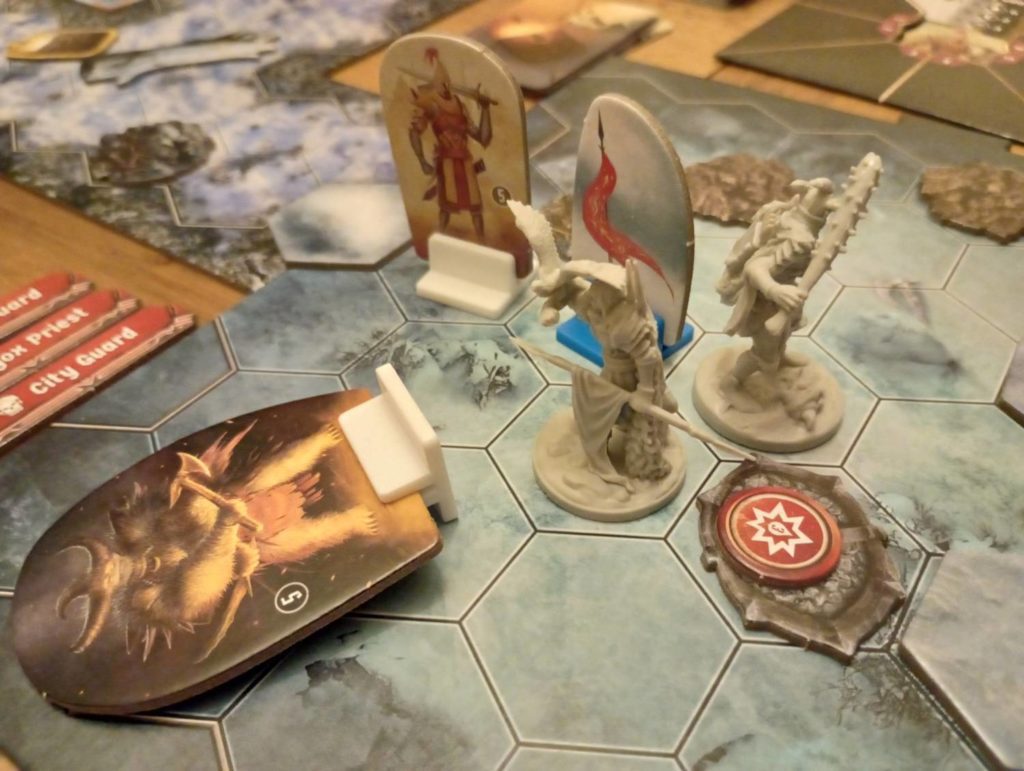
As to the game’s difficulty, Frosthaven does as good a job as the original of scaling up the difficulty for higher player counts by either adding additional enemies or upgrading normal ones into elite ones. From what I’ve seen, the math mostly adds up. However, I’ve found in my solo campaign—running two characters by myself—that some scenarios and even some classes were quite clearly designed for the full player count. I can think of one particular scenario in my solo campaign where I failed at least four times before finally just cheesing my way through and calling it a day. I’m sure it’s theoretically possible for any particular combination of characters to win any scenario, but that might require a level of skill that I may never reach.
Andrew: Whilst we’ve not encountered any real issues at two, I’d definitely agree with you Jesse that some of the classes would do much better at the full player count.
Summary
Jesse: Frosthaven is everything that its predecessor was but better, a no-brainer for Gloomhaven fans who want a deeper, richer experience, despite its daunting scope and occasional habit of tripping over its own massive scale.
Andrew: I’ve grumbled a bit but it’s only because Frosthaven gets so much right that the roadblocks it puts in the way are doubly frustrating. For me Frosthaven is an incredible but imperfect tabletop gaming experience, one that I’m excited to continue exploring in the coming months and (probably) years!
David: With Gloomhaven, I was just glad to finally retire a character. We’re maybe 10 scenarios into our campaign and there are already 4 or 5 character classes waiting for us to unlock, and the game isn’t dictating which one we’ll have to unlock next. I love that. But, what I love even more is that the starter classes (in my case, the Blinkblade) are typically awesome enough that you’re hesitant to put them away. I love that pull between discovering something new and really getting to know what you’ve already got. Frosthaven manages that very well!
Will: There’s no game quite like Frosthaven, and I don’t think there will be anytime soon. Isaac Childres is taking this system and setting and blowing it up into a real juggernaut. Despite my gripes about some of the unwieldiness of the game, Frosthaven is still a masterclass in game design and marrying mechanics to theme. It’s an intensely satisfying co-op puzzler wearing a dungeon crawler’s costume. And that’s to say nothing of the absolute sheer epic scale and spectacle on display here. The pageantry, pomp and circumstance are part of the experience, and it delivers.
–
So there we go. Four sets of thoughts from four different experiences with Frosthaven. We’re positive about those experiences too, broadly. Sure, we’re lukewarm on the practicalities of the new Outpost phase but we all agree that it adds so much to the narrative and world-building of the whole experience that it’s worth the occasional bit of boring bookkeeping. And sure, it’s not a flawless production, gorgeous though it is. We’ve each got our own solutions to dealing with all the stuff and at least two of us are backing the map books in the current BackerKit campaign, which should make setting up a breeze.
But if you’re able to push past those barriers, then we feel that Frosthaven is an incredible game, building on everything that’s come before to create a richer and more complete experience.
Disclosure: Meeple Mountain received one free copy of this product in exchange for an honest, unbiased review. The other three copies of Frosthaven discussed in this review were purchased by the authors themselves. This review is not intended to be an endorsement.


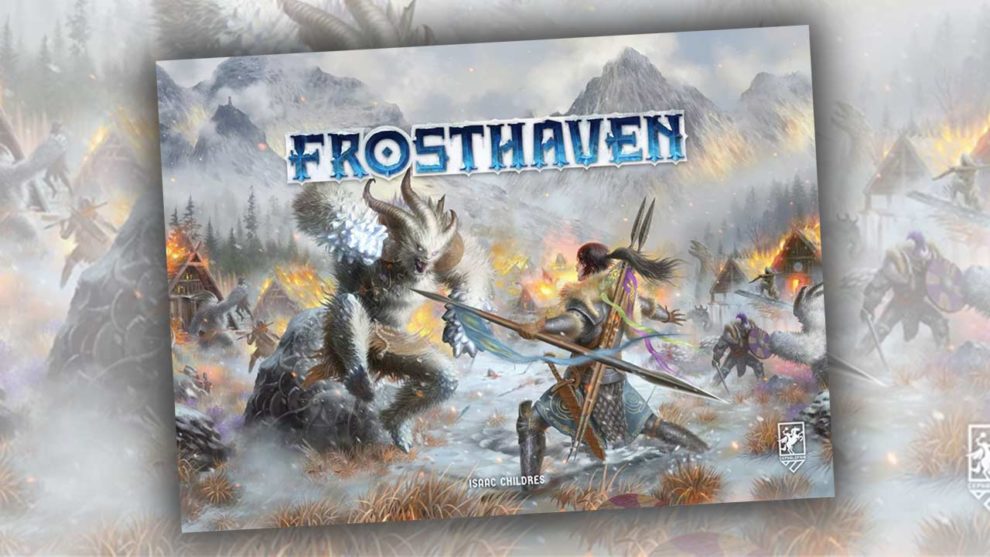

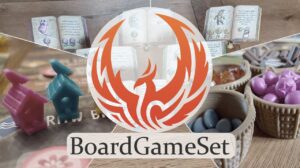
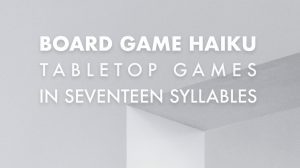
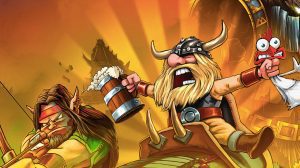





Add Comment